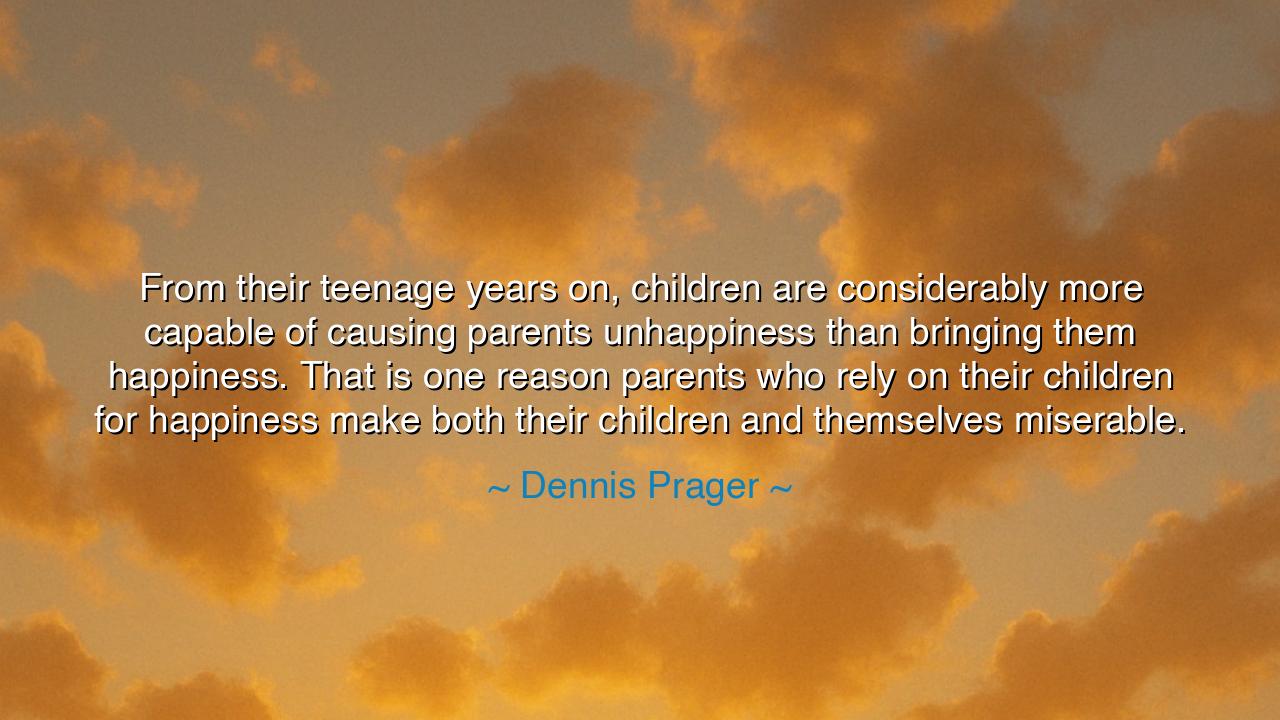
From their teenage years on, children are considerably more
From their teenage years on, children are considerably more capable of causing parents unhappiness than bringing them happiness. That is one reason parents who rely on their children for happiness make both their children and themselves miserable.






Hear now, O keepers of hearth and lineage, the words of Dennis Prager, a thinker of our age who spoke with the gravity of old wisdom: “From their teenage years on, children are considerably more capable of causing parents unhappiness than bringing them happiness. That is one reason parents who rely on their children for happiness make both their children and themselves miserable.” These words, though they may sting the heart, are not cruel — they are compassionate truth. They remind us that love, to remain pure, must be free from possession, and that the bond between parent and child, though sacred, must not become a chain.
In the old days, the wise elders knew that to raise a child was not to mold a servant of one’s joy, but to release a soul into the world. They understood that a parent’s duty is to give roots and wings — roots to ground the heart in virtue, and wings to let the spirit fly toward destiny. But when love becomes dependence, when the parent’s happiness is yoked to the actions of the child, the order of nature is reversed. The stream begins to flow backward, and both the giver and the receiver are poisoned by expectation. The child, burdened by the impossible task of fulfilling another’s emotional hunger, grows restless and guilty. The parent, longing for constant validation, becomes wounded by every rebellion. Thus, love turns into sorrow, and care into control.
Consider the tale of King Lear, that tragic monarch of Shakespeare’s design. In his old age, he sought not merely the love of his daughters, but the assurance of that love. He demanded words of flattery, gifts of affection, visible signs that his children would sustain his happiness. But love cannot be demanded — it must flow freely, or not at all. When Lear divided his kingdom and placed his heart in his daughters’ keeping, he lost both kingdom and peace. The daughters who praised him falsely betrayed him; the one who loved him truly, he cast away. In the end, his grief was not born of his children’s cruelty alone, but of his own dependence upon them for meaning. His tragedy is the mirror of Prager’s truth: a parent who seeks happiness through a child’s choices condemns both to suffering.
The teenage years, as Prager observes, mark the hour of awakening — when children, stirred by the call of freedom, begin to test the boundaries of their world. Their rebellion is not wickedness, but a sign of becoming. They seek their own voice, their own vision, and in doing so, they often wound the hearts that nurtured them. The parent, if wise, will bear this pain with dignity, as one bears the strain of watching a young bird take flight. To clutch tighter in such a moment is to crush the very thing one loves. To trust, to release, to stand firm in patience — that is the sacred test of parenthood.
There is a story from the East, of a humble farmer who raised his son with gentleness and discipline. When the boy grew restless and longed to travel, the father gave him a portion of his savings and said, “Go, and see the world. The road will teach you what I cannot.” Years later, the son returned, weathered and wiser. “Father,” he said, “why did you not try to stop me?” The father smiled and answered, “Because your joy was never mine to command.” This is the wisdom Prager speaks of: the understanding that love’s truest form seeks not to possess, but to empower.
To the parents who look to their children as the source of their happiness, hear this with tenderness: your task is not to be made whole by your offspring, but to help them become whole themselves. Find your meaning in your own deeds, your own virtues, your own relationship with the divine and the good. The child will not bear the weight of your fulfillment — nor should they. Let your love be unconditional, but your happiness independent. When you release your child from the duty of sustaining your joy, you set them free — and in that freedom, love grows stronger, more mature, more true.
So let this be the teaching passed down to you, O fathers and mothers of every generation: Raise your children in love, but do not bind your peace to their choices. Guide them with wisdom, but walk your own path of purpose. When they stumble, offer compassion, not despair. When they soar, rejoice — but do not measure your worth by their flight. The happiness of a parent, like the wisdom of an elder, must be self-sustaining — for only then can it be a light that guides, not a burden that crushes.
And finally, remember this: love that demands to be repaid ceases to be love. Love that seeks only to give becomes eternal. Thus, live as the ancients taught — loving without expectation, giving without condition, and finding in your own heart the wellspring of peace. Then, whether your children bring you joy or sorrow, you will stand unshaken — for your happiness will rest not in them, but in the strength and serenity of your own soul.






AAdministratorAdministrator
Welcome, honored guests. Please leave a comment, we will respond soon